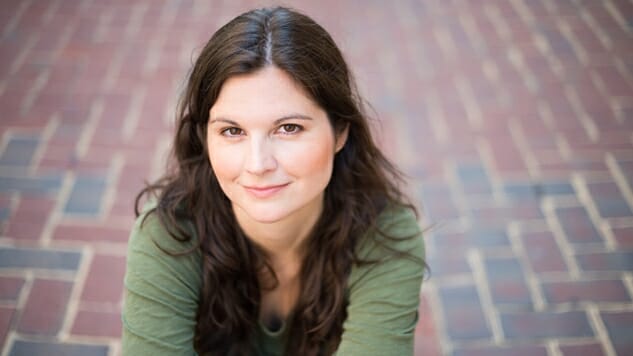Child Star-Turned-Author Lisa Jakub Talks Leaving Hollywood, Dealing with Media as a Teen and Connecting with Your Audience
Photo by Lisa Jakub
She’s been immortalized since her memorable roles in 1990s blockbusters like Independence Day and Mrs. Doubtfire , but her most significant work isn’t watched… it’s read. By leaving her acting career over a decade ago to focus on writing, Lisa Jakub hasn’t escaped the media (whom she clearly differentiates from the tabloids), but she’s certainly found her comfort zone within it. We chatted about life outside of the public eye, taking control of her destiny via self-publishing, and the importance of pleasing readers.
Paste: What was your relationship with the media during your acting career?
Lisa Jakub: I think a strong media is incredibly important, but as a young actor, I was pretty freaked out by them. I wasn’t “hounded” as much as some, but I still found it disconcerting. I never had any media training and I tended to feel I had to answer absolutely everything so I didn’t come off like a brat. It sometimes felt overly vulnerable, like I was being dissected for everyone to examine. I’m much more comfortable with the media now that I’m an adult and have learned the phrase “Sorry, I’m not going to answer that.” I have to start with “sorry”… I’m Canadian (laughs) It’s powerful to know you can share and be open but also set your own boundaries.
Paste: Were these media-related concerns a factor in your decision to leave the industry?
Jakub: There were many factors that played into my decision to leave the film industry, including the fact that I had worked for eighteen years and it was just time for a change. But I was definitely uncomfortable with the tenacity of tabloids and paparazzi and the way our culture fetishizes fame. I wasn’t good at being in the public eye the way that actors are required to be. People don’t care about writers in the same way, which suits me quite well. When I do something public, it’s on my terms.
Paste: Would social media have appealed to you during those days?
Jakub: Social media is wonderful and horrible. I love the fact that people can speak for themselves. It’s available to anyone with an internet connection and can be a beautiful way to build community. However, it also provides anonymity for people’s crueler instincts and can encourage stalker behavior and increase security risks. Learning how to share effectively on social media in my thirties is hard enough… I can’t imagine having to figure that out in my teens.
Paste: As a writer, what do you have to do to build a following for your book versus, say, 10 years ago?
Jakub: Social media and an engaging online presence are vital for writers. I have a blog, plus I use Facebook, Twitter, Instagram, and Snapchat. They can all be fantastic ways to get your work out into the world.
I’ve been surprised by how important a strong social media following is for traditionally published authors. It’s all about “author platform.” The ability to write a good book has nothing to do with the ability to tweet or post a selfie, but that seems to be an integral measure for traditional publishers. I understand that—they want to ensure they make money in a struggling industry, and if you have hundreds of thousands of Twitter followers, a certain percentage of them are going to buy books. The problem is that seems to set up a bar to entry that feels unreasonable and largely unrelated. Many talented writers are overlooked by traditional publishing houses because they don’t have a large online following. I think readers are worse off for it.
That’s one of the many reasons that I’ve decided to self-publish my new book. (It’s about anxiety and depression and it will be out this summer.) I went with a traditional publisher for my first book, but I’m excited to explore this new way. Self-publishing puts the control back in the hands of the artists, and I love that.
Paste: Is there a line between writing enough on the internet to build a fanbase versus giving away too much to get people to then pay for a book?
Jakub: With blogging, I can make my writing accessible to everyone who wants to read it. I write to connect and reassure people that they are not alone in the struggles of life. However that happens is fine by me. I’m well aware that not everyone has the discretionary income to spend on buying books. So, I assume that the people who want to support my work will attend one of my speaking events, or share a blog post or buy a book. I focus on putting my best effort out there and assume it’ll be reciprocated somehow.
Paste: How and what are people reading differently than 20 years ago, and do you have to adjust your writing style to tailor it to today’s audiences?
Jakub: Obviously, the e-reader has changed how people read. I love my Kindle (and the fact that when I go on vacation I don’t need an extra suitcase for books) but I also have bookcases overflowing with physical books. I tend to be container neutral—whatever gets people to read is awesome.
But that doesn’t change the way that I write. I learned early on that I can’t write for others. I’m a born people-pleaser anyway, so if I give into that tendency and try to write to impress others, it shows. My writing becomes forced and uninteresting. So, I write for myself, I write from my heart about the issues I think are universal human experiences and I put it out in the world and let go of the outcome. Trying to keep up with writing trends is exhausting and results in everybody writing about zombies.







































